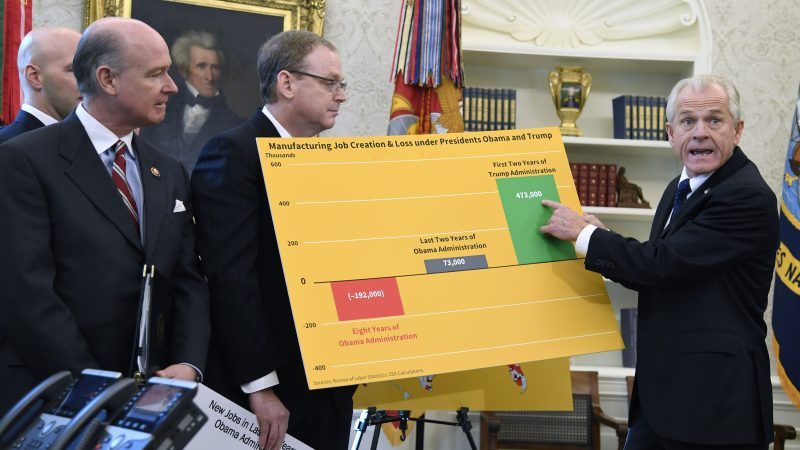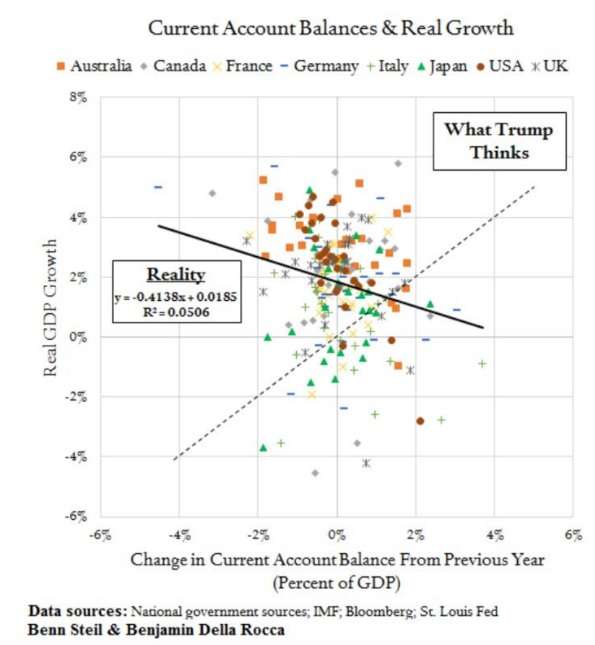Trump's Anti-China Trade Advisor Invented a Fake Economist To Sell His Protectionist Views
Peter Navarro also said Americans wouldn't pay the costs of Trump's tariffs, a claim that seems to be equally fabricated.

"Only the Chinese can turn a leather sofa into an acid bath, a baby crib into a lethal weapon, and a cellphone battery into heart-piercing shrapnel," warns Ron Vara in the pages of Death by China, a 2011 book coauthored by Peter Navarro.
"The manufacturing Dragon is voracious. The Colonial Dragon is relentless. The American Eagle is asleep at the wheel," Vara opines later in the book—the same book that reportedly convinced Jared Kushner to ask Navarro to become Trump's top economic advisor back in 2016. Navarro is now director of the White House's National Trade Council.
And Vara? He's a Sinophobic stock broker, a military vet, and a Harvard alum. He pops up in several of Navarro's supposedly nonfiction books dating back at least to the 1990s. And he is not a real person, as Navarro admitted this week to Tom Bartlett, a senior writer at The Chronicle of Higher Education. Bartlett discovered this after getting a tip from the Australian economist Tessa Morris-Suzuki, who noticed some inconsistencies in Vara's story and emailed some colleagues at Harvard to see if Vara ever studied there.
In a statement to the Chronicle, Navarro said Ron Vara (an anagram of "Navarro") was a "whimsical device and pen name I've used throughout the years for opinions and purely entertainment value, not as a source of fact." He compared Vara's role in the books to how Alfred Hitchcock used to make cameo appearances in his own films.
But Hitchcock was making fictional films. Navarro was writing allegedly nonfiction books about economics and foreign affairs, and he was using Vara as a xenophobic mouthpiece. And Navarro's co-authors don't seem to have been in on the joke. When contacted by the Chronicle, two people who worked with Navarro on books in which Vara appears said they had no idea he wasn't a real person. I wonder if Hitchcock's camera operators would have been similarly surprised? Probably not.
It does make a sort of sense, though. Of course Navarro made things up in his economic books. After all, he's been making things up while advising the White House too.
Take what he told Fox Business in March 2018, just a day after the Trump administration announced new tariffs on imported steel and aluminum. "I don't believe any country in the world is going to retaliate," Navarro said.
Well, they did. And the administration has now spent more than $25 billion to bail out farmers hurt by the retaliation that Navarro said wouldn't happen.
Or think about Navarro's oft-repeated claims that Americans are not paying the cost of the tariffs. That's simply a lie. Study after study (after study after study) have confirmed that, yes, of course Americans are paying for the tariffs. Because tariffs are a tax on imports, and their singular purpose is to make it more expensive to purchase imported items.
This is not news, unless you're "a White House economist who never learned economics," which is how actual economist Deirdre McCloskey described Navarro in the April Reason.
The closer you look at Navarro's track record, the more you might start to suspect he's just been making everything up this entire time. A significant portion of the administration's rationale for starting a trade war in the first place was the idea that America's trade deficit with China is a serious problem. Who was pushing that idea? Navarro, who claims trade deficits—the difference between the value of goods a country imports from another country and the value of goods it exports to that same country—reduce jobs and wages.
"Because imports don't contribute to gross domestic product, unfair trade reduces growth, and narrowing the trade deficit through higher exports and lower imports boosts growth," Navarro wrote in a Wall Street Journal op-ed this year.
That's about as real as Ron Vara. Navarro is apparently ignorant about how imports affect gross domestic product calculations—read Tyler Cowen and Alex Tabarrok explain that exact error if you want to get into the technical nitty-gritty—and he's also implying a correlation where none exists. The size of a country's trade deficit (or surplus) has no connection to how quickly or slowly that country's economy grows.
As Benn Steil illustrated it in Business Insider last year:

Even when Navarro isn't making it all up, he has a tendency to get sloppy. National Review's Kevin Williamson called him out in 2017 over a history of plagiarism and misleading citations. Among the problems Williamson identified: Navarro had cited a 25-year-old study that claimed China was helping Iran develop nuclear weapons without noting that the study was 25 years old—or that subsequent studies by the same authors had concluded China was no longer engaged with Iran's nuclear ambitions.
The revelation that Navarro planted his very own Tyler Durden inside several of his books doesn't tell us anything we didn't already know about Navarro's propensity for fabricating reality. But it does provide another excellent reason not to take him seriously. Inventing a fictional alter ego doesn't, on its own, disqualify Navarro from being Trump's top economic advisor—but the other things he's done while serving in that capacity certainly should.
The White House might as well replace Navarro with Ron Vara. Vara may be fictional, but his understanding of economics couldn't be any worse.



Show Comments (206)